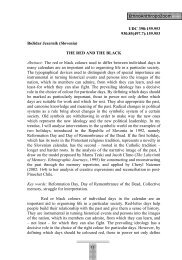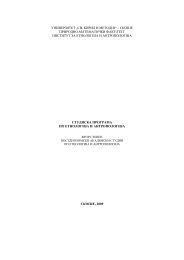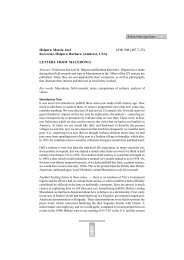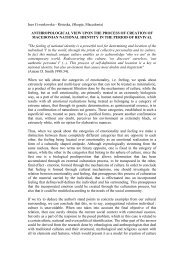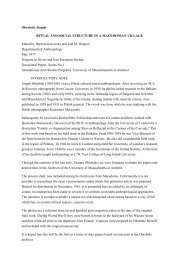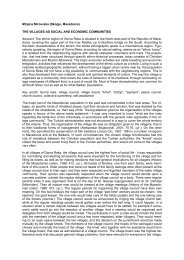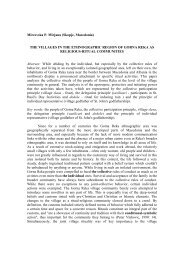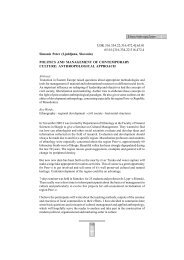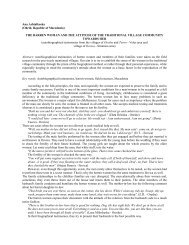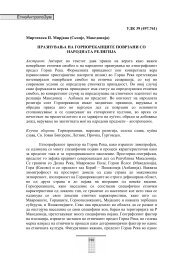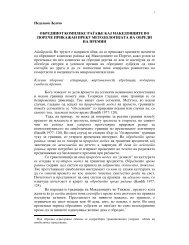Davorin Trpeski (Skopje, Macedonia) Understanding Of Tradition ...
Davorin Trpeski (Skopje, Macedonia) Understanding Of Tradition ...
Davorin Trpeski (Skopje, Macedonia) Understanding Of Tradition ...
Create successful ePaper yourself
Turn your PDF publications into a flip-book with our unique Google optimized e-Paper software.
more so after <strong>Macedonia</strong> became independent and separated from ex-Yugoslavia, national feelings<br />
and nationalistic ideology started to appear. This led to a bigger conservatism among the<br />
population, and greater belief in tradition. Dunja Rihtman - Augustin explains this phenomena<br />
that appears in almost all post-socialistic societies, as an unique response and reaction towards<br />
totalitarianism that has suppressed and repressed the local and individual expression (Rihtman -<br />
Augustin 2000 : 27).<br />
Together with tradition, one of the most important things in identifying a certain ethnic<br />
group is an ethnic characteristic. The ethnic group is a special kind of cultural community that<br />
emphasises the role of myths, family trees and historical memories, and could be detected following<br />
a certain or numerous cultural differences, for example the religion, customs, language or<br />
institutions. These communities are historical, not because historical recollections are necessary<br />
for their further existence, but also in the sense that such an ethnic group is a product of special<br />
historical forces, so that they undergo historical changes and could also fall apart (Smit 1998 :<br />
39).<br />
According to Frederik Barth (Putinja, Stref-Fenar 1997 : 215-216), the term "ethnic group" is<br />
used when one wants to determine a certain population that:<br />
- Is biologically maintained<br />
- Have mutual basic cultural values that produce unique cultural forms<br />
- Presents a space for communication and interaction and<br />
- Presents a sum of members that identify themselves, but are as well identified by others<br />
as category that differs from the others.<br />
Antoni D. Smit (Smit 1998 : 40-41), notes six attributes by which one could define an ethnic<br />
community:<br />
- Collective name<br />
- Myth for mutual ancestors<br />
- Mutual historical past<br />
- One or more than one element of mutual culture<br />
- Connection to a certain homeland and<br />
- Feeling of solidarity of a part of the population.<br />
Antoni D. Smit also adds the fact that the more traits that the given population possesses<br />
from this list of the obtained attributes, the more it gets closer to the ideal type of ethnic community.<br />
During the reconstruction of ethno genesis and ethnic history of a certain ethnic group, the<br />
ethnic continuity plays an important part. Proving the ethnic continuity of a certain group is often<br />
a function of ethnocentric theories and ideologies that try to prove the cultural, spatial and historical<br />
importance and domination of one group over another. Ethnocentrism is formed upon<br />
prejudices towards ones own or foreign group and it presents itself in the form of nationalchauvinism<br />
or perverted nationalism (Petrovic 1990 : 19).<br />
In the frames of the older and more developed Western states that have powerful bureaucratic<br />
apparatus and developed economic systems, there were also conditions for creating conflict<br />
between the ruling part of the society on one side and the citizens' elite on the other. The<br />
latter did not have either the possibilities or enough force for revolutionary change of the regimes,<br />
so that the basic way of expressing their revolt was through transformation and uniting its<br />
class that through its role of enlightenment should enable it to know itself and to attain its real<br />
identity and security. Through this created community, its members have tried to attain security,



